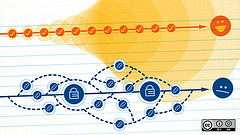MPEG-LA targets Google's VP8 Video Codec


As a MPEG-LA representative told ZDNet's Ed Bott, "Yes, as we have said in the past, we believe VP8 uses many patents owned by different parties. To the extent VP8 includes technology owned by others, then a pool license which removes uncertainties regarding patent rights and royalties by making that technology widely available on the same terms to everyone would be beneficial to the market."
In a statement, Google said that "MPEG-LA has alluded to a VP8 pool since WebM launched--this is nothing new. The Web succeeds with open, community-developed innovation, and the WebM Project brings the same principles to web video."
So what's really going on here? I asked Andrew "Andy" Updegrove a founding partner of Gesmer Updegrove, a top technology law firm, and a leading expert on patent law for his take on the situation and this is what he told me.
Updegrove would like to know "How did this effort start? At the one end of the spectrum, this could be an initiative purely of MPEG-LA smelling business. At the other end, they're just a service provider that has been approached by a group of companies that helped set this standard and want it to manage the pool."
In this case, it's pretty clear that it's MPEG-LA looking for patent law-suit ammo, but it would be nice to know more about who the movers and shakers are behind the efforts to create a VP8 patent pool and what their motivations are.
Updegrove continued, "Why are they polling the marketplace? On the one hand, it doesn't make sense, because the pool can only charge so much, and the more patent claims get thrown into the pot, the less each claim owner gets for that claim. The reason is that pools usually only work well when everyone, or just about everyone, who has a necessary claim joins in. Otherwise, there's not enough benefit (or resignation) on the part of implementers to do business with the pool. They might instead just take a 'so sue me' attitude, and pay up only to those patent owners that hunt them down after negotiating with them."
Sure, he continued, "If the pool really does gather in all of the patents, then it's easy to take a single license from a single source, and also less problematic, because you'll know that your competitors are doing the same (i.e., they have the same incremental added cost to their products), so it all zeroes out, from a competitive point of view."
Since Google, the owner of VP8, isn't a party to MPEG-LA's efforts to create a patent pool, it seems likely that MPEG-LA is acting as a patent troll. As I see it, what MPEG-LA's wants to do is to stop VP8 from becoming an accepted Web video standard or, if does become accepted over its own MPEG-based standards such as H.264, to profit from it with patent fees.
Welcome to the real role of software patents: not pushing technology forward, but maximizing the money for people and businesses that have nothing to do with actually creating anything new. The upcoming MPEG-LA vs. VP8 patent battles will not serve the good of any Web user or developer, it will only reward, if anyone, MPEG-LA and its litigators.